Environment
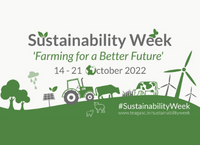
Reducing Greenhouse Gas Emissions
Reducing Greenhouse Gas Emissions Methane (CH4), nitrous oxide (N2O) and carbon dioxide (CO2) are greenhouse gases generated by agriculture, which have a negative impact on climate change. In agriculture methane (CH4), nitrous oxide (N2O) are the most important. Agriculture contributes over one third of Ireland’s national greenhouse gas emissions. Agriculture now has […]
14 October 2022

First steps to achieving our emissions reduction target – Webinar on Friday, 14 October at 9.30am
First steps to achieving our emissions reduction target – Webinar on Friday, 14 October at 9.30am Signpost Sustainability Week 2022, takes place from Friday, 14 October – Friday, 21 October 2022, with a focus on ‘Farming for a Better Future’. On 14 October Teagasc will host a webinar discussing ‘First steps to […]
13 October 2022

Signpost Photo Competition
Signpost Photo Competition We are inviting you to submit photos, capturing the actions that you are taking to reduce emissions on your farms. About the Competition The Signpost Programme is running this photo competition in advance of Signpost Sustainability Week which takes place on the 14th to the 21st of October. The photo competition […]
12 October 2022
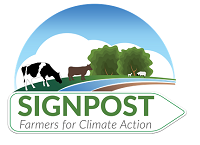
Climate Actions for October
Climate Actions for October October climate advice includes soil sampling, applying lime to correct soil pH, checking your soil maps and hedge cutting advice. There is also advice on doing a self assessment of your farm’s environmental sustainability and checking your Bord Bia feedback report for your carbon footprint figure. Soil Sampling […]
11 October 2022

Signpost Sustainability Week 2022
Signpost Sustainability Week 2022 Signpost Sustainability Week 2022 takes place from Friday, 14 October – Friday, 21 October 2022. This week will focus on ‘Farming for a Better Future’ with a series of public in person and virtual events. Friday, 14 October – Friday, 21 October 2022 Sustainability Week 2022 will consist of […]
11 October 2022
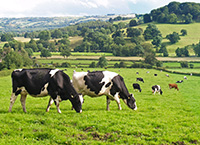
The impact of selecting cows using the economic breeding index on methane output
The impact of selecting cows using the economic breeding index on methane output A major challenge facing the agricultural industry is to reduce greenhouse gas emissions by 25% by 2030. The contribution of genetics should be considered when quantifying environmental impacts as breeding is cumulative and permanent; meaning any positive or negative […]
10 October 2022
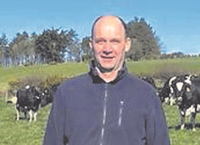
Signpost Featured Farmers – Raymond Goggin
0 Signpost Featured Farmers – Raymond Goggin Raymond Goggin is farming at Templemartin, Bandon Co Cork with his wife Delia. They have three children Cian, Conor and Aoibhinn. Raymond and Delia are one of the Teagasc Signpost demonstration farms who are leading the way in reducing GHG emissions on their farms along with […]
9 October 2022
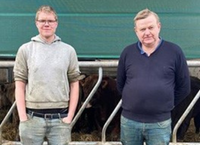
Signpost Featured Farmers – Eamon & Donnchadh McCarthy
0 Signpost Featured Farmers – Eamon & Donnchadh McCarthy Eamon and his son Donnchadh are farming in Carrigeen, Glendine, Youghal, Co. Waterford. Both work part-time on the farm. In addition, Eamonn works as a relief milker and Donnchadh has a full-time off farm job. They farm 45.47ha in 3 blocks including 4.6ha in barley and 11.7ha in […]
9 October 2022
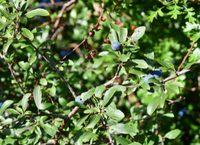
Growing wild – Guelder Rose and Sloes
0 Growing wild – Guelder Rose and Sloes Catherine Keena, Teagasc Countryside Management Specialist takes a closer look at some of our native Irish biodiversity to look out for in the countryside. This week Catherine writes about Guelder Rose and Sloes, and how to spot them. Guelder Rose Look out for translucent crimson […]
8 October 2022
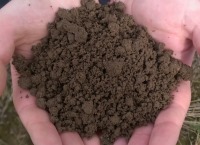
National Soil Fertility Trends 2021
0 National Soil Fertility Trends 2021 These trends could indicate early signs of declining soil fertility levels nationally. Farmers should put plans in place to protect the productivity and long term sustainability of their farming business. The 2021 soil fertility results indicate that soils with optimum pH, Phosphorus (P) and Potassium (K) fertility […]
8 October 2022
